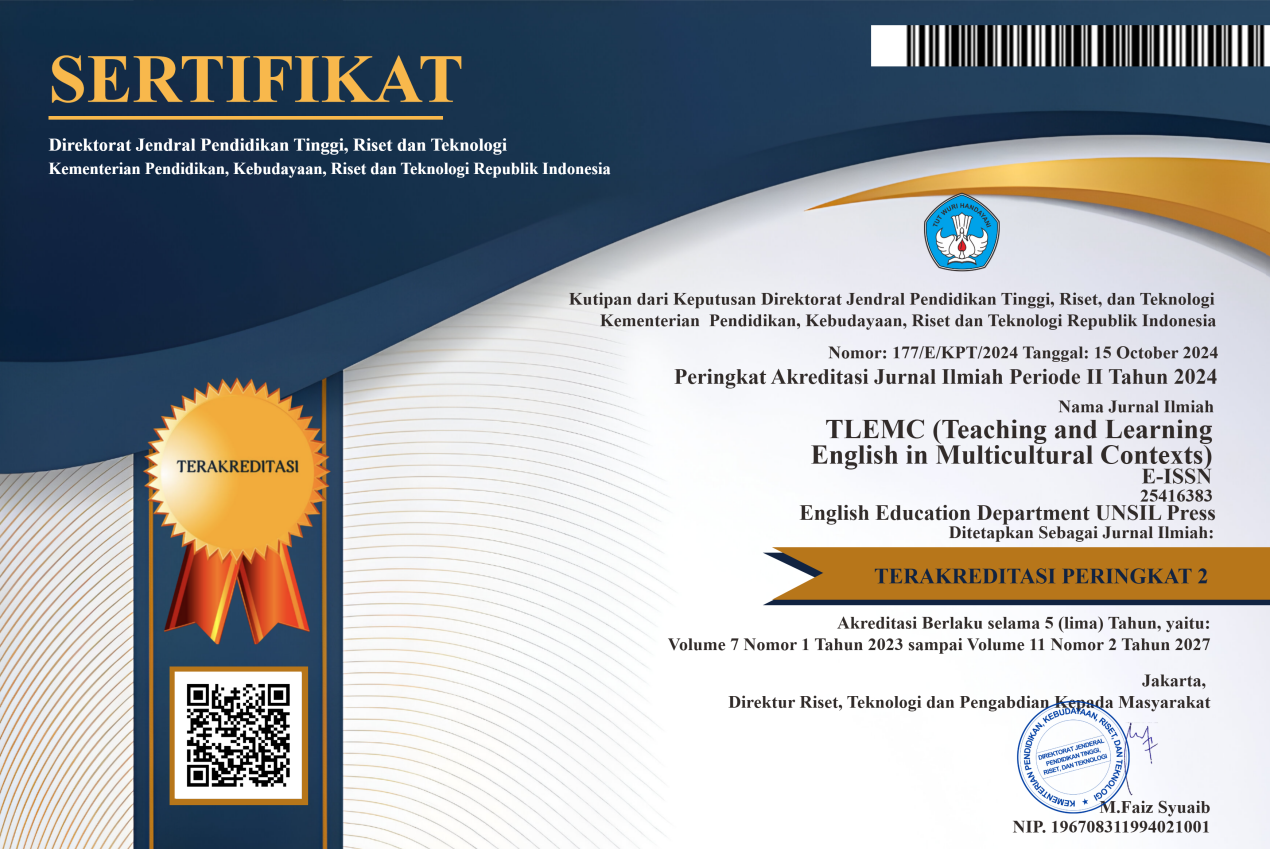A Classroom Action Research: Improving Speaking Skills through Work in Pair Technique
Abstract
This Classroom Action Research (CAR) is implemented to improve students’ speaking skills at one of the junior high schools in Batam. The subjects of this research were 32 second-semester students in grade 7. The research was applied in two cycles following the procedures for action research, namely planning, action, observing, and reflecting. The researchers used classroom observation, document analysis, pre-test, and post-test to collect data. The findings show that the Work in Pairs method improves students’ speaking skills in class. This can be seen from the improvement of students' speaking skills in each cycle. The students achieved 57.26 for the pre-test which is categorized poor. After implementing Work in Pairs activities in two cycles the students’ average scores improved. The post-test was 65,33 in the first cycle and 72,93 in the second cycle. This proves that students responded positively to the Work in Pairs method. It can be concluded that working in pairs activities have a strong influence on improving students’ speaking skills.Â
Full Text:
PDFReferences
Achmad, D., & Yusuf, Y. Q. (2014). Observing pair-work task in an English speaking class. International Journal of Instruction, 7(1), 151–164.
Afrizal, M. (2015). A classroom action research: improving speking skills through information GAP activities. English Education Journal (EEJ), 6(3), 342–355.
Angraini, Y. (2016). Rules of three analysis in persuasive public speaking presentation. ANGLO-SAXON: Jurnal Ilmiah Program Studi Pendidikan Bahasa Inggris, 7(1), 3. https://doi.org/10.33373/anglo.v7i1.542
Aulia, M. P., Lengkanawati, N. S., & Rodliyah, R. S. (2020). The use of pair work to reduce speaking anxiety in an EFL classroom. Advances in Social Science, Education and Humanities Research, 430(Conaplin 2019), 134–137. https://doi.org/10.2991/assehr.k.200406.027
Burns, A. (2010). Doing Action Research in English Language Teaching. In Doing Action Research in English Language Teaching. https://doi.org/10.4324/9780203863466
Dalisa, Y., Apriliaswati, & Husin. (2015). Reducing anxiety in speaking English through pair work. Jurnal Pendidikan Dan Pembelajaran Khatulistiwa, 4(2), 1–14. https://jurnal.untan.ac.id/index.php/jpdpb/article/view/8951/8888
Darmuki, A. (2019). The Development and Evaluation of Speaking Learning Model by Cooperative Approach. II(2), 1–19.
Garpersz, S., & Uktolseja, L. J. (2020). The use of serial picture media to improve english speaking ability at SMP YPK Syaloom Klademak Sorong City. Jurnal Pendidikan Bahasa, 7(2), 36–45.
Gynan, S., & Baker, C. (2011). Foundations of bilingual education and bilingualism. The Modern Language Journal, 78, 390. https://doi.org/10.2307/330123
Jatmiko. (2017). The implementation of pair work to improve students’ english speaking to the second semester st Pharmacist Program Of Health Sciences Faculty Of Kadiri University. Journal of English Teaching and Research, 2(1), 1–13.
Maca, S. (2020). Teaching English Speaking Skill through Pair and Group Interview Techniques. Ethical Lingua: Journal of Language Teaching and Literature, 7(2), 329–337. https://doi.org/10.30605/25409190.192
Mulya, R. (2016). Teaching speaking by applying pair work technique. English Education Journal (EEJ), 7(1), 74–86.
Pushpanathan, T., & Satheesh, S. (2017). Pair work as an effective teaching technique in language classroom. Research Journal of English (RJOE), 2(3), 206–211.
Wuryaningtyas, C. J. (2015). Peningkatan Keterampilan Berbicara dengan Pendekatan Komunikaif-Integratif. Penelitian, 19(1), 102–108.
Zohairy, S. (2014). Effective pairwork strategies to enhance Saudi pre-intermediate college students’ language production in speaking activities. European Scientific Journal, 10(2), 50–63.
DOI: https://doi.org/10.37058/tlemc.v6i1.4834
Refbacks
- There are currently no refbacks.
INDEXED BY:
This work is licensed under a Creative Commons Attribution-NonCommercial-ShareAlike 4.0 International License.
![]()
TLEMC (Teaching and Learning English in Multicultural Contexts)
Program Studi Pendidikan Bahasa Inggris
Fakultas Keguruan dan Ilmu Pendidikan
Universitas Siliwangi
Jl. Siliwangi No. 24 Kota Tasikmalaya - 46115
email: tlemc@unsil.ac.id





